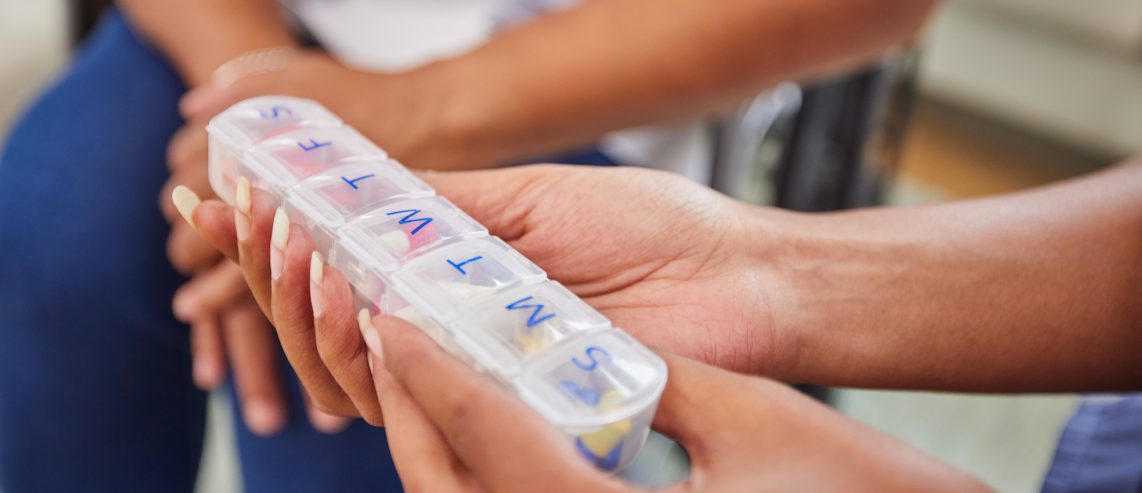Taking your medication as prescribed is one of the most important things you can do for your health. It doesn’t require a lot of time or effort, but it’s something many people have a hard time doing.
One of the big reasons why people fail to take medication as prescribed: forgetfulness.
If you struggle with how to remember medications or don’t take your medications as prescribed for other reasons, you’re not alone. Up to 50% of people don’t take their medication when and how they should, according to the World Health Organization. This is called medication non-adherence.
It’s okay if you forget to take your medication every now and then. To get the most out of your medication, adherence means taking 80% or more of your prescribed doses. That’s according to a report in the journal U.S. Pharmacist.
But if you forget more often than that, it can put your treatment — and health — at risk.
Never Miss a Beat!
Subscribe to Our HealthBeat Newsletter!
Thank you for subscribing!
You can now select the specific newsletters you'd like to receive.
You are already subscribed.
Subscribe to more newsletters in our email preference center.
Sorry, an error occurred. Please try again later.
Get Healthy Tips Sent to Your Phone!
Risks of Not Taking Your Medication as Prescribed
Not following doctor’s orders about how and when to take your medication can impact you in many ways. It can impact your quality of life, your health outcomes, and your overall healthcare costs. According to the U.S. Pharmacist report, if you don’t take your medication as prescribed it can lead to:
- Treatment failure. If you are sick or have an ongoing medical condition, such as diabetes or heart disease, you may not get better — or may even get worse. Not taking medications as prescribed accounts for up to 50% of treatment failures in the U.S. each year.
- Hospitalization. You may end up in the hospital. Medication non-adherence causes up to 25% of hospital stays each year.
- Death. Not following your treatment may lead to early death. Medication non-adherence accounts for about 125,000 deaths each year.
How to Remember Medications
Sometimes you may have a hard time remembering when and how to take your medications. Reasons you may struggle with remembering your medications include:
- You have several medications to take each day.
- You have different medications at different times.
- You have several doses throughout the day.
- You aren’t sure whether you already took the medication.
Tips for remembering medications
If you often find yourself forgetting to take your medications, these tips to remember taking medications may help.
- Use weekly pill boxes. Labeled with each day of the week, plastic pill boxes are a cheap and easy way to organize your pills. You can buy them with one row — or with two rows if you take pills both in the morning and evening.
- Set up electronic reminder alerts. Use your smartphone or smartwatch to help you remember. Choose a catchy sound that you use only for your medication. That way you won’t confuse it with an incoming text or email alert.
- Write it down and cross it off. You can also use a paper calendar or daily “To Do” list to help you remember to take your meds. Once you take them, cross it off the list.
- Download a pill-tracking app. Going high-tech can help you remember to take or refill your medications. Consumer Reports recommends CareZone, Medisafe, and Round Health as free pill apps with good online privacy policies.
- Use “smart” medication containers. Connected to the Internet, “smart” bottles and “smart” pill boxes beep to let you know when it’s time to take your next dose. Some also count the number of times you open them, so you know if you’ve taken your dose for that day or time.
- Set up automatic refills on your medication. If you run out of refills, that can keep you from taking your medication as prescribed. You may end up missing two or more days if your refill gets delayed.
- Schedule home delivery of your medication. Sometimes you might forget to pick up your medications from the pharmacy. If you’re on long-term medications, you may find it easier to get your medications by mail.
- Ask your pharmacist about convenience packaging. With convenience packaging, you receive all your medications bundled together and labeled with the dates and time of day to take them. This can help you avoid confusion if you take more than one medication several times a day.
When to Talk to Your Doctor or Pharmacist
Forgetting is not the only reason people don’t take their medications as prescribed. These are other reasons you may struggle to take your medications. If you talk to your doctor or pharmacist, they can help work through these other issues.
Here are the common reasons (besides failing to remember) why you may not take your medication as prescribed:
- You don’t understand why you need to take your medication. Some medical conditions don’t cause symptoms, so you may think your medication isn’t doing anything. If you don’t know why taking your medication matters, your doctor can explain how it affects your long-term health.
- You have medication side effects. Your doctor or pharmacist can offer tips on managing medication side effects. Sometimes they can lower your dose or switch you to medications with fewer side effects.
- You have problems reading or opening medication bottles. Ask your pharmacist for large-print medication labels or easy-open bottles.
- You can’t afford the cost of your medication, so you skip or split your pills. Talk to your doctor or pharmacist about savings cost, such as generic versions of your medication or manufacturer coupons.
- You stop taking your medication because you feel better. Ask your doctor when you can stop taking your medicine. For example, if you don’t finish an antibiotic, your infection may return — or the antibiotic may not work for you in the future.
Important safety note
Keep pill boxes, easy-open bottles, and bundle packets out of reach of children or pets. You can store them up high or in a locked medicine box or closet. This can avoid accidental overdose.
Sources
From Pill Organizers to Apps, How to Manage Your Meds. Consumer Reports. August 3,2017. Link.
'Smart' Pill Bottles Aren't Always Enough to Help the Medicine Go Down. NPR. Link.
Kleinsinger F. The Unmet Challenge of Medication Nonadherence. 2018. The Permanente Journal. Link.
Brown, M. T., & Bussell, J. K. Medication Adherence: WHO Cares?. 2011. Mayo Clinic Proceedings. Link.
Medication Adherence: The Elephant in the Room. U.S. Pharmacist. Jan. 19, 2018. Link.
About UPMC
Headquartered in Pittsburgh, UPMC is a world-renowned health care provider and insurer. We operate 40 hospitals and 800 doctors’ offices and outpatient centers, with locations throughout Pennsylvania, Maryland, New York, West Virginia, and internationally. We employ 4,900 physicians, and we are leaders in clinical care, groundbreaking research, and treatment breakthroughs. U.S. News & World Report consistently ranks UPMC Presbyterian Shadyside as one of the nation’s best hospitals in many specialties and ranks UPMC Children’s Hospital of Pittsburgh on its Honor Roll of America’s Best Children’s Hospitals. We are dedicated to providing Life Changing Medicine to our communities.

